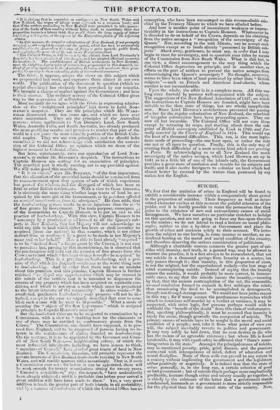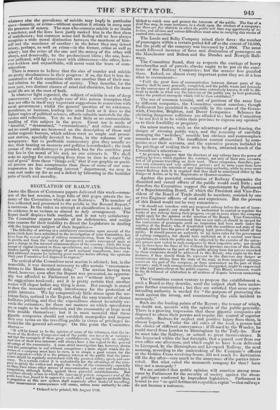SUICIDE.
Wx fear that the statistics of crime in England will be found to exhibit a considerable increase within a comparatively short period in the proportion of suicides. Their frequency as well as deter- mined character excites at this moment the painful attention of the public, and it is hardly possible to resist the persuasion that they point to the existence of new and extraordinary causes of social derangement. We have ourselves no particular crotchet to indulge on this question, and are not going to force any fine-spun theories on the reader; we do not intend to read a lecture on moral philo- sophy, neither to aim a by-blow at Government and place the growth of crime and madness solely to their account. We intro- duce the subject as one having, in some manner or another, an un- doubted bearing on the moral and social condition of the country, and therefore deserving the serious consideration of politicians. Although a charitable custom connects the greater part of sui- cides with insanity, and truth, in a general way, may be allowed to warrant the practice, it is a fact always to be remembered, that not one suicide in a thousand springs from insanity as a source, but only passes through it ; that insanity, in this proportion of cases, is not the original, but the superinduced malady—the last stage of mind contemplating suicide. Instead of saying that the insanity causes the suicide, it would probably be more correct, in innume- rable cases, to say that the suicide causes the insanity,—meaning by that, that the serious contemplation of the act, the reasonable, un-inud resolution formed to commit it, first unhinges the mind; thus occasioning the deed to be accomplished in derangement, though not through derangement. We would not have juries reason in this way ; for if many escape the posthumous reproaches which attach to conscious self-murder by a verdict at variance, it may be suspected, with strict logic, few persons perhaps would wish to withhold the "benefit of the doubt" from this class of' unfortunates. But, speaking philosophically, it must be asserted that insanity is rarely the cause, though generally the companion of suicide. The • primary causes of suicide have to be sought in the moral and social' condition of a people; and, take it from what point of view you will, the subject inevitably reverts to politics and government. It may very safely be laid down, that no man desires to die who has the means of an agreeable existence ; but where life is found intolerable, it may with equal safety be affirmed that "there's some- thing rotten in the state." Amongst the principalcauses of suicide, may be mentioned poverty, pride, grief, disease, and the passions connected with intemperance of mind, defect of education • and moral discipline. None of these evils can prevail to any extent in a country without implicating the government and the legislature either positively or negatively. It is indeed true that the state of crime generally, is, in the long run, a certain criterion of good or bad government ; but of suicide this is perhaps more emphatically predicable, because though crime and misery usually go together, it i3 chiefly by the existence of the latter that a government stands condemned, inasmuch as a government is more strictly responsible for the physical than for the moral state of the country. Now,
whatever else the prevalence of suicide may imply in particular cases—insanity, or crime—without question it attests in every case the presence of misery. The man who commits suicide is no doubt a murderer, and the laws have justly ranked him in the first class of malefactors; but common sense and feeling will no less always recognize a wide moral distinction between the murderer of him- self and the murderer of another : in the latter they may detect misery, perhaps, as well as crime—in the former, crime as well as misery; but the crime of the one and the misery of the other will always, and deservedly, be the predominant ideas ; the one, how- ever palliated, will fer ever meet with abhorrence—the other, how- ever reckless and unjustifiable, will never want the tears of com- miseration.
There is reason to believe that the sins of murder and suicide arc pretty simultaneous in their progress : if so, the fact is less de- monstrative of their connexion with one another than of their mu- tual relation to the condition of society. They describe, for the most part, two distinct classes of mind and character, but the same social ills are at the root of both. In whatever light regarded, the subject of suicide is one of deep concernment : scarcely a single case of this nature transpires that does not offer in itself very important suggestions in connexion with social government ; whilst the general question of its existence, prevalence, or increase, leading the mind back as it does to the highest topics of political science, affords valuable materials for dis- cussion and reflection. Yet do we find little or no commendable handling of this subject in the press. Great use is made of "dreadful," "determined," "extraordinary," and other suicides ; and no small pains are bestowed on the description of these and similar cognate horrors, which seldom want an ample and promi- nent station, specially devoted to them, in the columns of our newspapers : but to profitable commentary give they usually no rise; their bearing on manners and politics is overlooked ; the rank carcase of the self-destroyer is paraded, but for the nutritive part that lies in the moral of his end, no one extracts it. We shall make no apology for attempting from time to time to educe "time soul of good" from these "things evil," that if our graphic or poeti- cal powers are less conspicuous than those of some of our con- temporaries in the "startling interest" department, we may in seine sort make up for so sad a defect by labouring in the humbler paths of truth and morality.



























 Previous page
Previous page